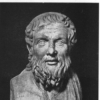Apollonius of Tyana

Apollonius of Tyana
Apollonius of Tyana, sometimes also called Apollonios of Tyana, was a Greek Neopythagorean philosopher from the town of Tyana in the Roman province of Cappadocia in Anatolia. Being a 1st-century orator and philosopher around the time of Jesus, he was compared with Jesus of Nazareth by Christians in the 4th century and by other writers in modern times...
NationalityGreek
ProfessionPhilosopher
arabia armed beasts commonly crooked heads horrible man nor seen wider
In my travels, which have been wider than ever man yet accomplished, I have seen many, many wild beasts of Arabia and India; but this beast, that is commonly called a Tyrant, I know not how many heads it has, nor if it be crooked of claw, and armed with horrible fangs.
kept none regularly reject temples
I delight to lodge in such temples as are not regularly kept closed. None of the gods reject me; they make me partner of their roof.
direct since
In my judgment, excellence and wealth are direct opposites, since when the one shrinks, the other grows, and when one grows, the other shrinks.
human knowing truth understand wonder
You need not wonder at my knowing all human languages; for, to tell you the truth, I also understand all the secrets of human silence.
conduct difficult furnish hard matters
If you have problems of conduct that are difficult and hard to settle, I will furnish you with solutions, for I not only know matters of practice and duty, but I even know them beforehand.
diseased godlike higher tend
Pythagoras said that medicine is the most godlike of arts. But if the most godlike, it should tend to the soul as well as the body, or else a living thing must be unhealthy, being diseased in its higher part.
man perceive
It is a true man's part not to err, but it is also noble of a man to perceive his error.
commune time
It is at the time of dawn that we must commune with the gods.
friendship future neither nor towards
I feel friendship towards philosophers, but towards sophists, teachers of literature, or any other such kind of godforsaken people, I neither feel friendship now, nor may I ever do so in the future.
begin good time
Don't keep your good manners to the end another time, but begin with them.
contains equivalent stones subject theaters unless useless wisdom
Multicolored stones and paintings, walkways, and theaters are useless in a city unless it also contains wisdom and law. Such things are the subject of wisdom and law, not equivalent to them.
acquire deserve gods good humans might please power seems wisdom
The gods do not need sacrifices, so what might one do to please them? Acquire wisdom, it seems to me, and do all the good in one's power to those humans who deserve it.
laws men poor pray
I pray as follows: May justice reign, may the laws not be broken, may the wise men be poor, and the poor men rich, without sin.
creates masters money plato principle rejoice
Plato said that virtue has no master. If a person does not honor this principle and rejoice in it, but is purchasable for money, he creates many masters for himself.